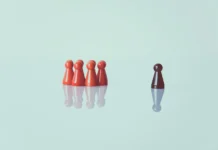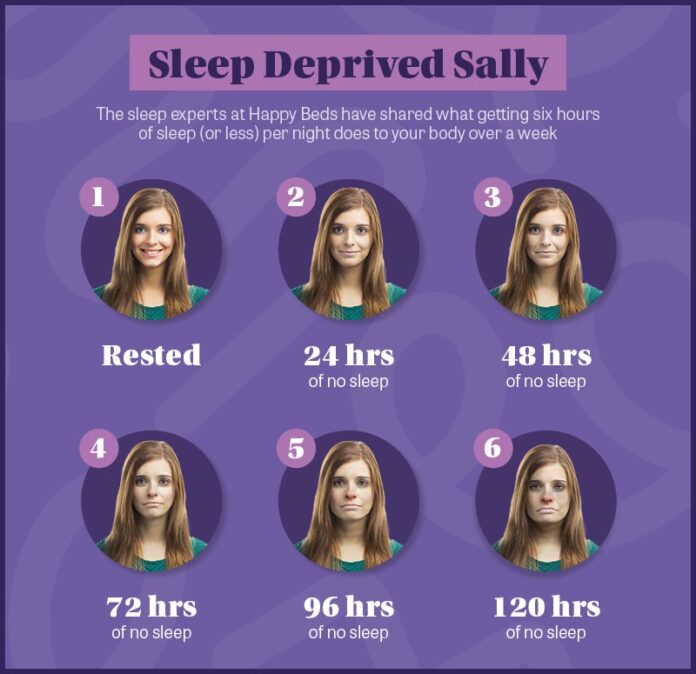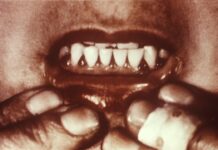The current NHS guidelines recommend that all adults need between seven and nine hours of sleep each night to function at their best. However, this sleep should also be undisturbed and comfortable, allowing your body to fully rest and recover during Rapid Eye Movement (REM) sleep. This is when the brain becomes more active and the body is at its most relaxed, helping that rest and recovery occur.
But what happens if we don’t achieve that level and quality of sleep? Using their resident sleep expert, Dr Katherine Hall, Happy Beds have visualised the effects of getting six hours of sleep or less by creating a digitally rendered Sleep Deprived Sally, and her equally tired friend, Sleep Deprived Sam.
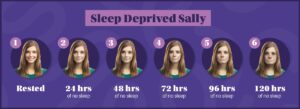
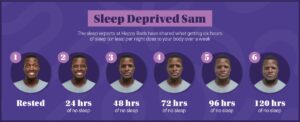
.
A well-rested Sally and Sam
As you can see, Sally and Sam both look happy and healthy with the recommended sleep every night. Their skin is full of colour and their eyes look bright, with no bags or wrinkles. The expression on their faces suggests that they’re happy, something that makes a big difference to her outward appearance.
24 hours of being sleep-deprived
No major health complications but some visible signs of sleep deprivation including dark circles under the eyes, puffy eyes, and tremors. Some people experience increased food cravings, anger, and irritability. Drowsiness, fatigue, decreased alertness, and an increased risk of making mistakes are also common.
3 days of being sleep-deprived
Between 24 hours and 3 days, the previous symptoms intensify with an increased urge to sleep. Some people experience brief periods of sleep known as microsleeps which only last 30 seconds and occur without you realising it. Cognitive performance is drastically impaired from decision-making to memory and a slow reaction time. More obvious physical symptoms include extreme fatigue, increased inflammation, and a compromised immune system.
4 days of being sleep-deprived
This is when extreme sleep deprivation kicks in. Staying awake becomes increasingly harder. Hallucinations are not uncommon and may include seeing, hearing, or feeling things that aren’t really there. You may also notice increased irritability, fatigue, stress, anxiety, and depersonalisation, or the feeling that you’re observing yourself from outside your own body or that your surroundings aren’t real.
5 days of being sleep-deprived
The urge to sleep and the frequency of microsleeps will increase and intensify. Hallucinations may now include delusions, illusions, and disordered thinking. All of the physical symptoms mentioned previously remain and may worsen.
6 days of being sleep-deprived
At this stage, your urge to sleep will feel unbearable and your perception of reality will be severely impaired and distorted. You may not be able to accurately perceive and process information, resulting in a state of psychosis.
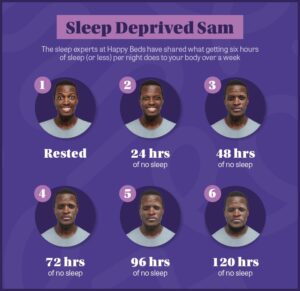
What are the non-physical symptoms of being sleep-deprived?
However, there are consequences of sleep deprivation beyond the physical changes, including:
- Poor health: A person who has a large sleep debt may also experience hallucinations, confusion, memory loss and other cognitive problems. However, sleep deprivation has also been linked to an increased risk of heart disease and stroke, as well as diabetes, obesity and depression. Poor quality sleep can also affect your immune system, making it harder for your body to fight off infection.
- A low mood: Being sleep deficient can also affect mood and emotions by causing irritability, anxiety and depression.
- Choosing other unhealthy habits: Many people also reach for unhealthy foods or substances when they’re tired. For example, if you’ve had a long day at work and don’t feel like cooking dinner, you may end up buying fast food. Or if you want some extra energy during the day, it might be tempting to reach for coffee or energy drinks, however, too many of these and too late in the day can worsen your sleep that night, too.
- Poor decision-making or reactions: It can also lead to poor judgment and decision-making. Research has found that the brain works slower when it’s tired, which means you might not notice or take action on important information. This is especially dangerous when driving as you may not react to a hazard, and end up crashing.
- Bad performance at work: Equally, not getting enough sleep can make it harder for you to concentrate on tasks or make decisions — which can affect your professional life. Research has also suggested that poor-quality sleep may be associated with an increased risk of workplace accidents and injuries.
Six ways to recover from sleep deprivation
1. Set a routine
Try to make sure you’re going to bed and getting up at the same time each morning and night. Weekends can often negatively impact your routine, so stick to a consistent time throughout the week. Find your optimum sleep time and aim to reach this every night.
2. Create a relaxing environment
Your room should be dark, quiet and free from distractions. Light and noise can cause you to wake up throughout the night, so invest in curtains, black-out blinds, and earplugs if you’re a light sleeper. Electronic devices such as TVs or computers can also affect sleep quality, so create a room designed primarily for sleeping – you’ll quickly notice the difference in how well you sleep.
3. Avoid tech before bed.
Similarly, avoid using your phone or social media just before bed. Blue lights from electronics can cause your brain to become more alert, meaning you struggle to fall asleep. Instead, try reading a book. This helps your brain switch off and your body unwinds, meaning you’ll fall into a natural, healthier sleep.
4. Try relaxation techniques
Creating a relaxing evening routine can be hugely beneficial when it comes to falling asleep. Having a bath, spending a little time on a skincare routine, or even meditating before bed can help. Plus, creating a routine signals to your brain that sleep is coming, making it easier for you to switch off and fall asleep when the time comes.
5. Exercise more regularly
Being active throughout the day helps your body get into a consistent routine. This also helps ensure you’re tired at the right time of night, meaning you fall asleep more easily and are much less likely to wake up throughout the night.
6. Avoid food and drink triggers
Avoid caffeine in the evening, as caffeine can significantly impact sleep quality. It’s also sensible to avoid big meals too close to bedtime and avoid sugary foods, which can cause a spike in energy levels. Despite initially causing sleepiness, alcohol can also disrupt sleep, so it is best avoided if you’re struggling with the quality of your sleep.

|
| Help keep news FREE for our readersSupporting your local community newspaper/online news outlet is crucial now more than ever. If you believe in independent journalism,then consider making a valuable contribution by making a one-time or monthly donation. We operate in rural areas where providing unbiased news can be challenging. |














